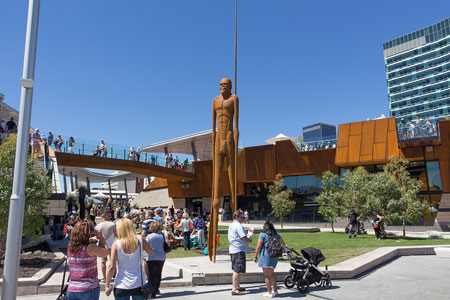City of Gosnells Greek Translation Services
Perth Translation Services » Perth » City of Gosnells Translation Services » City of Gosnells Greek Translation Service
City of Gosnells Greek Translation Services
Get fast and professional translation services in City of Gosnells. Our Greek translators provide translation of all types of documents. These include confidential legal, financial and migration document translations.
Upload Document For Translation

City of Gosnells
The City of Gosnells is a local government area in the southeastern suburbs of the Western Australian capital city of Perth, located northwest of Armadale and about 20 kilometres (12 mi) southeast of Perth's central business district. The City covers an area of 128 square kilometres (49.42 sq mi), much of which is state forest rising into the Darling Scarp to the east, and had a population of approximately 118,000 at the 2016 Census.
City of Gosnells History
The name Gosnells dates back to 1862 when Charles Gosnell who was the owner of London cosmetic company John Gosnell & Co., bought Canning location 16 from the Davis family who were the original grantees in 1829. While the purchase of the land was a personal investment by Charles Gosnell, when the land was sold to developers in 1903 the developers used the association to the well known cosmetic company, claiming it had bought the land because of its fertile soil to grow flowers for the manufacture of its perfume range. The abundance of the Arum Lily (Zantedeschia aethiopica) in the area and the marketing by the developers contributed to the myth about the Gosnell company, being so successful that the Gosnells railway station was constructed on the Armadale line in 1903.
Gosnells Road District was created out of the abolished Canning Road District on 1 July 1907. Industry in the form of brickworks were introduced to Beckenham in the early 1990s. Between 1912 and 1915 fruit fly wiped out nearly all of the stone fruit crops in the region and many farmers turned to dairying and market gardening. Irrigation was vital due to sandy, infertile soils of Canning Vale. In 1923, the City received land from Jandakot Road District when that entity was abolished. Significant development did not occur until the post-war years. The population grew from 7,400 in 1954 to about 11,000 in 1966, and then to 21,000 in 1970. On 1 July 1961, Gosnells Road District became a Shire following enactment of the Local Government Act 1960. On 1 July 1973 it became a Town and exactly four years later it attained City status.
City of Gosnells Suburbs
Beckenham, Canning Vale, Gosnells, Huntingdale, Kenwick, Langford, Maddington, Martin, Orange Grove, Southern River, ThornlieAbout the Greek Language
The Greek language is the official language of Greece (Hellas) and Cyprus. It was first spoken in Greece and was also once spoken along the coast of Asia Minor (now a part of Turkey) and in southern Italy. It was also widely used in Western Asia and Northern Africa at one time. In Greek, the language is called Ελληνικά (elliniká).
Greeks write their language using the Greek alphabet. The Latin alphabet (used to write English and many other languages) came from the Greek alphabet. Many other alphabets around the world also came from the Greek one, such as the Cyrillic alphabet.
Greek is an independent branch of the Indo-European language family. The ancient language most closely related to it may be ancient Macedonian, which many scholars suggest may have been a dialect of Greek itself, but it is so poorly attested that it is difficult to conclude anything about it. Independently of the Macedonian question, some scholars have grouped Greek into Graeco-Phrygian, as Greek and the extinct Phrygian share features that are not found in other Indo-European languages. Among living languages, some Indo-Europeanists suggest that Greek may be most closely related to Armenian (see Graeco-Armenian) or the Indo-Iranian languages (see Graeco-Aryan), but little definitive evidence has been found for grouping the living branches of the family. In addition, Albanian has also been considered somewhat related to Greek and Armenian by some linguists. If proven and recognised, the three languages would form a new Balkan sub-branch with other dead European languages.
Modern Greek inherits most of its vocabulary from Ancient Greek, which in turn is an Indo-European language, but also includes a number of borrowings from the languages of the populations that inhabited Greece before the arrival of Proto-Greeks, some documented in Mycenaean texts; they include a large number of Greek toponyms. The form and meaning of many words have evolved. Loanwords (words of foreign origin) have entered the language, mainly from Latin, Venetian, and Turkish. During the older periods of Greek, loanwords into Greek acquired Greek inflections, thus leaving only a foreign root word. Modern borrowings (from the 20th century on), especially from French and English, are typically not inflected; other modern borrowings are derived from South Slavic (Macedonian/Bulgarian) and Eastern Romance languages (Aromanian and Megleno-Romanian).
City of Gosnells Greek Translator Services
Greek translator for certified translation services:
- Greek driving license translation
- Greek financial translation and bank statement translations
- Greek birth certificate translation
- Greek marriage certificate translation
- Greek name-change certificate translation
- Greek degree translation
- Greek diploma translation
- Greek school transcript translation
- Greek passport translation
- Greek police report translation
- Greek police check translation
- Greek personal letters and cards
- Greek utility bill translations
- Greek death certificate translation
Perth Translation provides fast and affordable Greek translation services in the City of Gosnells for all types of personal documents by NAATI translators.
Languages Translated
- Arabic translation service
- Czech translation service
- Chinese translation service
- Croatian translation service
- Danish translation service
- Dutch translation service
- French translation service
- Finnish translation service
- Greek translation service

